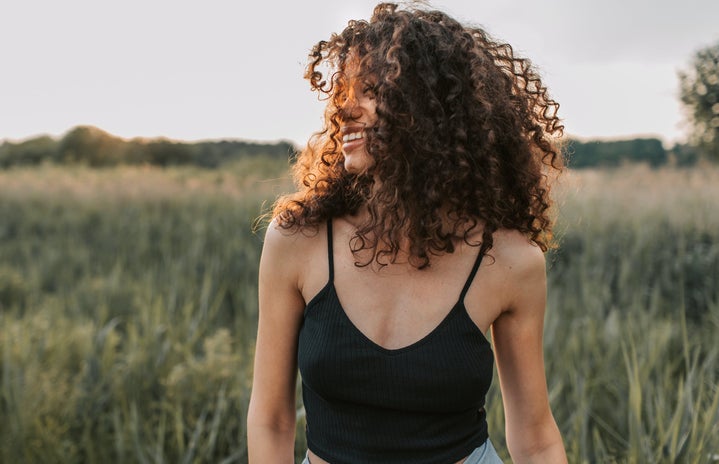Straight out the womb, I was a curly-head. My curls were plastered on my small forehead and sprung every time that I would move my head, and I would get a lot of compliments from family and strangers alike. However, my hair soon started changing and becoming straight after a few years. Maybe the curls were a mistake? No worries! I would wake up, brush my hair (straight down), and be able to go my merry way. I spent no second thought on my hair, since I had no recollection of my hair being curly when I was younger. This was where all my hair troubles were beginning.
Sometime in middle school, it was as if all of a sudden my hair decided to become unruly. It would poof up, have nonuniform curl and wave patterns, and never wanted to stay straight naturally anymore. I was like, what gives? My sister’s hair was naturally straight and thin, so she had no problem with how her hair looked, ever. My mom had a pixie cut, so she also didn’t need a lot of upkeep on her hair besides regular cuts. How the hell did I even have curly hair in the first place?
The answer, it came out, lied within my dad. While his hair currently is seen as a very simple, almost militaristic cut, his hair is also susceptible to timely changes. For the majority of his life, he actually had a black afro – the wonderful thing too, is that he spent no time shaping or taking care of it. According to him, he should wake up in the morning, give it a general circular shape, and maybe put a comb in his hair to add some flare; there wasn’t any intense upkeep that he was doing for his hair, and eventually, the afro even went away into the hair that he has today. After learning that my curly hair wasn’t fully unknown, I now knew what it needed – upkeep.
My hair wasn’t similar to how my dad described his – mine was unruly, tangled, and to me, terribly ugly. In order to keep a facade of straight hair, I straightened my hair every single day – yes, every. Single. Day. I didn’t want my hair to be seen as ugly by the other students at my school, and I definitely didn’t see it as deserving either. I knew no other student that had the same hair as me that kept their hair natural – most either kept their hair in braids or straightened their hair, so I decided that I would follow the trend.
It wasn’t until I hit a deep depression in my teenage years that made me question a lot about myself and my appearance. My dad called out to me from the bathroom one night, “honey, why are you always straightening your hair? Your hair is so beautiful, what are you doing changing it?” There was anger in his voice, but I understood that it came from a place of helplessness and confusion. Why was his daughter always changing the hair she naturally came with? Why was his daughter changing the hair she got from him and his family?
It was when I began understanding how my dad and his family had curly hair and its implications when I began to appreciate my hair more and more. My dad, with his afro, didn’t do much upkeep, so he wasn’t able to offer me much advice. His mother however, had long, beautiful hair down to her waist. He would tell me how she would use rice water to take care of her hair, wrap her hair late at night, and braid it to make it the healthiest that it could be. I didn’t truly believe it until I saw pictures, and then I started really understanding the weight that my hair held to me. My hair didn’t only represent myself and my seemingly Western way of beauty, but my hair was a symbol of my family’s beauty – my family’s identity, history, and their place in the world. With this knowledge, how could I continue covering my curls?
All throughout high school, I didn’t straighten my hair as often as I did before. Instead, I saved it for only a few times a year. Instead, I began investing in my hair and its beauty – hair masks, oils, bonnets, silk, anything, you name it. I wanted to take care of my hair for myself because I should be proud of my natural hair, and it slowly started to become second nature for me to flaunt it. I started to stop what other people thought of me was important in any regard, and started doing what I thought was right for me and my hair.
Things only got easier once I went to college. For the first time, my school was comfortably diverse, and I was able to see so many different ways that people styled and took care of their curly hair. Also, it was finally a time where I was able to see curly hair be celebrated by others, and it made me feel like curly hair is something to celebrate in all of its different forms and styles. It was an incredible feeling to be able to see curly hair whenever I went to class, on a walk, or sitting within a store. I finally felt more comfortable with my hair and seeing the different people rock their hair, knowing that their hair has a history as well.
Though I had a rough journey of accepting my curly hair, I’m immensely grateful for the hair that I have and I wouldn’t want it any other way. My hair holds history, meaning, and beauty. My hair is a tradition, an identity, and everyone in my family with curly hair holds its story. I never want other children to believe that their natural hair is not beautiful, and I want them to know that their hair is equally as perfect as other types of hair. Having curly hair does not mean that your hair is unruly, tangly, frizzy – your hair is exuberant, lively, and sparkling. I hope that everyone that naturally has curly hair is able to see the beauty in theirs, the same way I see the beauty within mine.


